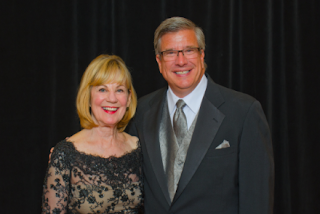
by jboullion | May 11, 2017 | Uncategorized
 |
Co-Chairs of the Wisconsin Legislature’s Joint Finance
Committee, Sen. Alberta Darling and Rep. John Nygren. |
Positive steps were taken today on two issues of importance for clean energy and Wisconsin power customers!
The State Legislature’s Joint Finance Committee met to set the budget of the Public Service Commission for 2017-2019, which includes both Focus on Energy and intervenor compensation funds.
Both of the wins described below gained 16-0 bipartisan votes by the Committee, which is made up of 12 Republicans and 4 Democrats.
First, the budget for intervenor compensation was partially restored after a 66% cut two years ago. The budget going forward will double to $742,500 annually. These funds enable nonprofit and citizen-based organizations to bring technical and legal expertise to proceedings at the Public Service Commission. RENEW Wisconsin has historically used this fund to support our advocacy in utility rate cases, power plant proposals, and numerous other proceedings at the PSC that impact renewable energy.
In addition, the Citizens Utility Board frequently uses this fund to bring expertise to cases in order to keep utility rates as low as possible for residential and small business customers across Wisconsin. Governor Walker had proposed this restoration of funds in his budget, and the Committee adopted it. This is great news, and we applaud Governor Walker and members of the Joint Finance Committee for adopting this provision.
Secondly, Focus on Energy’s budget will remain unchanged, allowing for the most cost-effective energy efficiency and renewables projects to be funded. The Governor has proposed to eliminate the ability for school districts to borrow above their revenue limit to fund energy efficiency and renewable energy improvements (commonly called “Act 32” projects). To backfill that change, the Governor proposed allocating an additional $10 million from Focus on Energy’s budget for schools above what they spent last year, which would have earmarked nearly $15 million out of the total $93 million for schools alone.
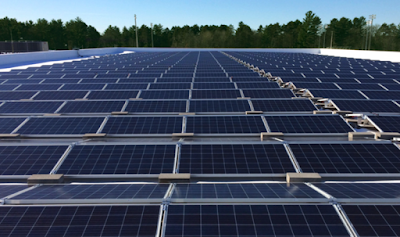 |
Solar PV installation on Lakeland Union High School in Minocqua,
part of an energy improvement project funded under the “Act 32” school district
revenue exemption. See the full case study from SunPeak. |
|
Concerns had been raised that schools would not be able to use that much Focus on Energy funding. The proposed earmark could have siphoned funding away from private business installations in energy efficiency upgrades, leading to unspent dollars in the Focus on Energy program and a less cost-effective set of investments.
The Committee voted 16-0 against the Governor’s proposal, leaving the Focus on Energy budgets unchanged. This is very good news since the program returns over $3.50 for every dollar invested, and schools will still have ready access to incentives through existing programs.
This sets up an important vote later in the Joint Finance Committee schedule regarding the Governor’s proposal to repeal the Act 32 school district revenue exemption.
RENEW Wisconsin was supportive of both of these successful measures through our participation in the Customers First Coalition.
The biennial budget needs the approval of both the Assembly and the Senate before being signed by the Governor. Typically, the budget process lasts through June.
For more information on these topics and the state budget, please see RENEW’s Clean Energy Summary of Governor Walker’s Budget, and our recap of the 2015-17 state budget.
Finally, please support our work: become a member of RENEW Wisconsin today!
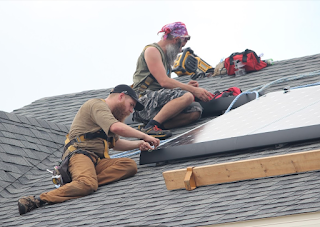
by jboullion | May 10, 2017 | Uncategorized
For Immediate Release
More Information:
Katie Crawley, Mayor’s Office
Katherine
Klausing, RENEW Wisconsin
614-406-1105
 |
A team from Full Spectrum Solar installs a solar array
for a 2016 Group Buy Participant |
May 9, 2017 –
Madison. The Cities of Madison and Middleton have selected the winning offer
from contractors who competed to serve the MadiSUN Solar Group Buy program, which
helps residents easily and affordably invest in solar electric systems on their
homes. The cities have selected a collaborative bid from Full Spectrum Solar and Midwest
Solar Power, two solar installation companies based in Madison.
The MadiSUN Solar
Group Buy program allows Madison and Middleton residents to “go solar”
together. MadiSUN used a competitive Request for Proposals process to
seek offers from solar companies across the region, and dozens of
companies were invited to bid. For the first time, the program selected a
collaborative bid from two companies, who will offer the same price and
services.
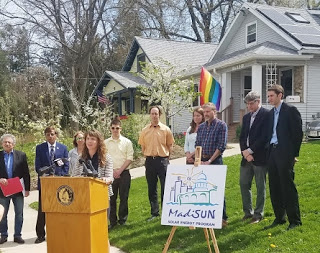 |
| The 2017 MadiSUN solar program launched on April 24, 2017 |
Katherine Klausing, MadiSUN Program Manager, said “we were really pleased with the
competitive offers we received.” The program evaluated bids based on pricing,
work quality, customer service and the company’s qualifications. “This is going to be a great deal for
families who are interested in going solar this year. Our participants say that
they feel better knowing there’s a trusted company that has been vetted by our
program. By going with the group buy and benefitting from the low price we
negotiate, families can save an extra 10 percent compared to what they would
pay to go solar alone.”
Alarik Rosenlund,
Co-Owner of Midwest Solar Power, says his company is happy to partner with
the program to bring more solar energy to local residents. “This year may
be a real sweet spot for anyone looking at installing solar, especially with
the tax credits and rebates available,” Rosenlund said. But it’s not just
about the economics. “This is a great way for people to take action on
something really important.”
The cost of installing solar has never been lower, and households
can receive a Federal Tax Credit for 30 percent of the system cost, while
Wisconsin’s Focus on Energy program offers up to $2,000 in additional rebates.
New solar education
events were also announced, aimed at helping residents learn more about
solar energy and the options available for installing solar. All events are
free and open to the public. The dates, times, and locations information
sessions are available at
www.madisunsolar.com/upcoming-events
and enclosed below.
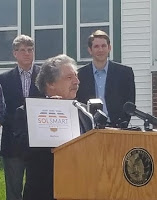 |
Madison Mayor Paul Soglin
accepted a SolSmart Gold award |
Madison earned a
“gold” designation from SolSmart, the highest level of
recognition from a national program under the
U.S. Department of
Energy’s SunShot Initiative. The “gold” designation recognizes the city’s
efforts to accelerate solar development, from improving permitting and zoning
for solar, to investing in financing and solar workforce training programs. The
announcement took place at on Monday at the National Planning Conference in New
York City.
“Madison’s commitment to continued utilization of solar
energy is genuine,” said Madison Mayor
Paul Soglin in a statement. “We have our Green Power Program in
which we train new workers to install solar, our goal of producing one Megawatt
of Solar by 2020 and incredible partnerships like SolSmart and others. We
are on our way!”
As a
SolSmart Gold designee, Madison received national recognition for adopting
programs and practices that make it faster, easier, and cheaper to go solar. A
SolSmart designation is a signal that the community is “open for solar
business,” helping to attract solar industry investment and generate economic
development and local jobs. Madison recently became the first community
in Wisconsin to commit to a goal of 100 percent renewable energy.
About
SolSmart
SolSmart
is a national designation and technical assistance program that recognizes
leading solar communities and empowers additional communities to expand their
local solar markets. Funded by the U.S. Department of Energy SunShot
Initiative, SolSmart strives to cut red tape, drive greater solar deployment,
and make it possible for even more American homes and businesses to access
solar energy to meet their electricity needs. Learn more at SolSmart.org.
About MadiSUN Solar
Group Buy
MadiSUN
works to expand solar energy adoption through a comprehensive, community-wide
approach. This group purchase program
is operated by RENEW Wisconsin Inc., a nonprofit organization, on behalf of the City of Madison, with support from the
City of Middleton. The goal of the program is to increase solar education and adoption in
the Madison and Middleton areas through a group purchase and competitive
bidding process. In conjunction with this program, RENEW Wisconsin and the City
of Madison will partner with Summit Credit Union to provide a special solar
loan program for Madison residents. This
summer, participants can learn more and sign up at madisunsolar.com.
Solar Information
Sessions
1. Madison
College, Truax Campus
Tuesday May 16th at 6pm
Protective Services Building, Room 215,
1701 Wright St, Madison
2. Goodman
Community Center
Tuesday June 6th at 6pm
Merrill Lynch Room, 149 Waubesa St, Madison
3. Good Shepherd
Lutheran Church
Tuesday June 13th at 7pm
Peterson Hall, 5701 Raymond Rd, Madison
4. Middleton
Public Library
Wednesday June 28th at 6:30 p.m.
7425 Hubbard Ave, Middleton
5. Catholic
Multicultural Center
Thursday July 6th at 7pm
1862 Beld St, Madison
6. Capital
Brewery & Bier Garten
Monday July 17th at 5:30pm
7734 Terrace Ave, Middleton
7. First
Unitarian Society
Sunday July 30th at 12:30 p.m.
900 University Bay Dr, Madison
###

by jboullion | Oct 20, 2016 | Uncategorized
Today, the Public Service Commission of Wisconsin authorized
approximately $7.7 million in rebates spanning 2017 and 2018 to spur small,
customer-based renewable energy projects throughout Wisconsin.
The rebates go to residential, business, and non-profit
customers of eligible Wisconsin utilities, and enable the customers to install
renewable energy technologies including solar, geothermal, biogas, biomass and
small wind systems.
 |
| Full Spectrum Solar installs a solar PV system via the MadiSUN program |
|
Tyler Huebner, Executive Director of RENEW Wisconsin, said,
“From our renewable energy perspective, Chairperson Ellen Nowak may have said
it best in her concluding remarks, stating, ‘This is a great win for
Wisconsin.’ Indeed, continuing the highly successful renewable energy rebates
for 2017 and 2018 is a great win. This
level of renewable energy rebate funding should support upwards of 500 solar
electric home installations, 70 or more home geothermal installations, and
dozens of larger business renewable energy projects for each of the next two
years. The program will help our
residents save money and our companies stay cost-competitive.”
The Commission asked Staff to recommend how the renewables
funding should be split between residential and business projects, as well as a
review of the incentive levels in light of the fact that technology prices for
renewable energy systems, specifically solar electric systems, have been
dropping very quickly in recent years.
RENEW Wisconsin will provide our recommendations, and those of the
renewable energy industry, to Commission Staff in the coming days.
In addition, the Commission will evaluate spending $10-$20
million to expand biogas production from anaerobic digesters on dairy
farms. Staff and program administrators
will be developing biogas program options for the Commission to investigate
within 30 days, along with program options for increasing Focus on Energy’s
energy efficiency and renewable energy impacts in rural Wisconsin.
The Commission agreed to lower its cash reserve from $30
million down to $5 million, which freed up dollars carried over from previous
years to be put into programs starting in 2017.
Huebner said, “We applaud the Commission freeing up millions of dollars
of ratepayers’ money from previous years to be put into programs now that will
enable energy and dollar savings for customers across Wisconsin.
RENEW Wisconsin was the lead advocacy organization promoting
the continuation of the renewable energy rebates. We provided two separate memos describing the
history and status of the renewable energy industry and its relationship with
Focus on Energy and advocating for a continuation of rebates. In addition, a sign-on letter promoting
continuation of renewable energy rebates, which was supported by 41 businesses
and organizations from throughout Wisconsin, was delivered to the PSC as part
of the public comment period in this proceeding.
The PSC had authorized a renewable energy loan program in
2014 and allocated $10 million to it over four years. Today, approximately two years into the
program, the PSC decided to end the program and spend the remaining funds
instead on rebates, which had outperformed the loan program in that two year
period.
Biogas production through anaerobic digesters will also see
a boost. The PSC re-committed to
spending $6.4 million on this technology, which it had authorized in 2014. An initial plan to focus on smaller dairy
farms was not as effective as envisioned.
Today, the PSC authorized the creation of an interagency working group
to identify opportunities to expand this technology and its benefits of
renewable energy production, water quality improvements, and on-farm revenue
stability, and indicated that programs between $10 and $20 million should be
investigated to spur this technology.
In its comments to the PSC, RENEW pointed out that we have
world-class companies working in anaerobic digesters right here in Wisconsin
that can help make this program a success.

by jboullion | Dec 23, 2014 | Uncategorized
 Here are some updates on Focus on Energy renewable energy programs, from recent meetings of the Public Service Commission and meetings RENEW has had with Focus on Energy staff.
Here are some updates on Focus on Energy renewable energy programs, from recent meetings of the Public Service Commission and meetings RENEW has had with Focus on Energy staff.
Residential Rewards funding for renewable energy projects (solar PV and geothermal)
All projects applied for by October 28th, 2014, will be receiving their cash-back reward for solar PV. It is expected that the $450,000 budget was exceeded by $200,000 or more, but the projects will be funded, and the extra funds will not be taken from other renewables funding.
RECIP Update
A project with a $400,000 grant in 2014 fell through, and the Commission directed that funding to be carried over to 2015 and used for renewable energy projects.
Focus on Energy staff are anticipating issuing a RECIP RFP in early 2015. The budget levels, from RENEW’s understanding, are that approximately $1.2 million should be available for RECIP projects that will be installed in 2015.
We are working with Focus on Energy staff to determine a RECIP schedule for 2015 and 2016 so that all installers know the schedule that is forthcoming and can plan accordingly.
2015 & 2016 Funding Update
For 2015, we expect:
– $1.2 million in RECIP, for projects installed in 2015
– $450,000 in residential rewards
– up to $2.5 million in new revolving loan program (more details below)
For 2016, we expect:
– About $3.0 million in RECIP projects that will be installed in 2016
– $450,000 in residential rewards
– $2.5 million in revolving loan program funding
The Commission will review the rebate and loan funding in mid-2016, to determine funding allocations for 2017 and 2018.
$6 million digester program for smaller farms updateThis program is still being scoped out. RENEW is gathering some feedback from digester developers, and at this point we anticipate Focus staff working to get more information from digester companies and farmers on the barriers to adopting digesters and what information, research, or implementation needs exist to bring digester technology down to smaller farms. As more details emerge and opportunities for feedback become available, RENEW will be in touch.
Loan Program Update
As of this writing, we understand the Focus on Energy staff is planning, at the high level, the following for the new loan program:
– Loan program will be largely based off Iowa’s “Alternative Energy Revolving Loan Program”
– Loans under $50k would be 1st come, 1st served, and would open in January
– Loans for over $50k would be completed through a quarterly RFP, and would start in March/April
– $2.5 million per year would be lent out for each of 2015, 2016, 2017, and 2018.
– Lending partners – any lender can become part of the program. Lenders will do the financial / credit check review of the applicants.
We will be working to get more details on this program and to make sure the industry is updated and has ample opportunity to ask questions and get them answered.
by RENEW Wisconsin | Oct 1, 2013 | Uncategorized
For the second time in three years, state of Wisconsin incentives for customer-sited solar and small wind systems has been suspended, a result of recent Public Service Commission (PSC) decisions affecting Focus on Energy’s renewable energy budget. Incentives for biogas and biomass installations are not affected by the PSC’s decisions.
The cut-off of solar and wind incentives follows an across-the-board suspension of renewable energy incentives that lasted one year before being lifted in July 2012. RENEW Wisconsin has issued a press release concerning the PSC’s decision below.
UPDATE: Check out Tom Content’s article on JSOnline for more information.
For Immediate Release
August 1, 2013
PSC Pulls Plug on Solar and Wind Incentives Again
PSC Vote a “Dark Day for Solar Energy in Wisconsin”
Focus on Energy has suspended incentives for solar and small wind energy systems for the remainder of 2013, as a result of a Public Service Commission (PSC) order approved last week. The funding suspension takes effect even though Focus on Energy has spent only $1.2 million of the $10 million budgeted this year for all renewable energy technologies.
The PSC split 2-1 on the vote stopping the flow of incentives for solar and small wind energy systems. Commissioners Phil Montgomery and Ellen Nowak approved the suspension order, while Commissioner Eric Callisto voted against the motion.
“In approving this funding stoppage, the PSC ignored the public comments of over 630 citizens and businesses who urged the agency to provide a consistent, stable program to promote solar and wind energy,” said Executive Director Tyler Huebner. “This will go down as a dark day for solar energy in Wisconsin.”
The funding suspension was triggered by a slowdown in demand for incentives for biogas and biomass energy systems. Though up to $7,500,000 in incentives is set aside for bioenergy projects, only $384,448 in incentives have been paid out to date in that category. Under an order adopted by the PSC in 2012, Focus on Energy must maintain a 75/25 percent funding split between the bioenergy category and the solar/small wind category.
“Prices for solar projects have dropped steeply in recent years and these projects are as cost-effective for residential and business customers as biogas is for farmers and food processors,” said Huebner. “In addition, the timelines for biogas projects are unrelated to those of wind and solar projects. Add these together, and there is no reason financial incentives for solar and wind should be contingent on the health of bioenergy market.”
“This decision further ‘boxes in’ the Focus on Energy administrator regarding these incentives. The stipulations added by the Commission appear to make the calculations mathematically unworkable. We can envision the program’s administrator resorting to a Ouija Board to figure out how much funding is available for solar and wind projects going forward.”
Burke O’Neal, co-owner of Full Spectrum Solar in Madison, discussed the impact on businesses. He said, “It’s really bad for business in Wisconsin to have a program that appears and then with very little notice disappears. It’s really hard to build a business and a stable industry when programs aren’t consistent.”
In his dissent, Commissioner Eric Callisto stated that Commission’s goal in its 2012 ruling “was to create market certainty, foster fiscal sustainability and program cost-effectiveness, and ultimately allow the funding of more biogas and biomass projects. The Commission’s decision today helps to advance none of those goals, but rather reintroduces substantial uncertainty into the renewables marketplace.” Callisto added, “If the Commission’s 75/25 split was meant to emphasize biomass and biogas resources, it isn’t working, and today’s decision won’t help.”
RENEW Wisconsin’s Tyler Huebner added, “In Wisconsin we send $12.5 billion out of the state each year to buy coal, oil, and natural gas. We don’t have any of those energy resources within our state. The Focus on Energy incentives for solar and wind should be available to help residents, businesses, and farmers take control of their energy bills and produce electricity in a self-sustaining manner. For a decade, the success of this program helped Wisconsin build a thriving small business market to deliver these alternative energy solutions to customers. With this latest suspension, that once-thriving market of businesses will take yet another hit, and sadly, the credibility of the entire Focus program certainly takes a hit too.”
—-END—-








